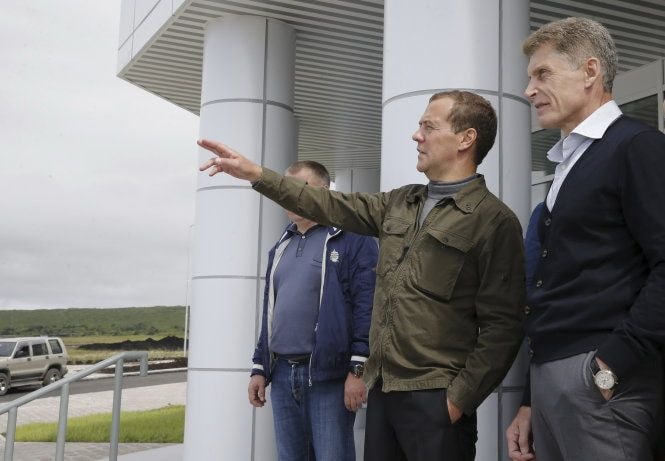Russia-Japan relations in turmoil
(Baonghean.vn) - Recently, Russian Prime Minister Dimitry Medvedev visited the disputed South Kuril Islands, which Japan calls the Northern Territories. Immediately after, Japan made a series of strong protests, causing tension in the relationship between the two countries.
Historical issues
The first Russo-Japanese agreement concerning the status of Sakhalin Island and the Kuril Islands was the Treaty of Shimoda of 1855, which resolved the dispute between the two sides. The Russian-Japanese border was defined as between the islands of Iturup (Etorofu), Urup (Uruppu) and two parts of the Kuril Islands.
Japan then established control over the disputed islands of Iturup, Kunashir (Kunashiri), Shikotan and Khabomai (Habomai), while Sakhalin Island remained under joint control of the two countries.
In 1875 under the Treaty of Saint Petersburg, Russia and Japan agreed that Japan would relinquish all sovereignty over Sakhalin Island in exchange for Russia relinquishing all rights to the Kuril Islands as well.
After the Russo-Japanese War (1904-1905) with Russia's military defeat, according to the Treaty of Portsmouth, Japan established control over Sakhalin Island to the south.
At the end of World War II, the Soviet Union declared war on Japan and reoccupied southern Sakhalin Island and the Kuril Islands. By 1949, all 17,000 Japanese residents of the islands had been expelled.
In 1956, the Soviet Union and Japan issued a joint declaration ending the state of war between the two countries. Moscow agreed to cede the Shikotan and Habomai Islands to Japan after signing a bilateral peace treaty. However, the treaty was not signed because the Japanese government demanded that the Soviet Union cede all four islands.
According to Diplomat magazine, there are currently about 30,000 Russians living on the Kuril Islands. Last June, Russian Defense Minister Sergei Shoigu ordered the acceleration of military base construction in the disputed areas. Oil and gas resources as well as fishing here also increase the tension in the dispute between the two countries. To date, Russia and Japan have not been able to sign a permanent peace treaty.
 |
| Russian Prime Minister Dmitry Medvedev visits Iturup Island in the Kuril Islands. Photo: Reuters |
The relationship is difficult to stabilize.
Responding to Russian Prime Minister Dmitry Medvedev's visit to the Kuril Islands, Japanese Prime Minister Shinzo Abe said he "deeply regretted it". Earlier, Hajime Hayashi, head of the European department of the Japanese Foreign Ministry, called the Russian Ambassador in Tokyo to protest.
According to some Japanese sources, Japanese Foreign Minister Fumio Kishida will also postpone his visit to Russia, which was planned for the end of August. Meanwhile, Russian Prime Minister Medvedev said that Japan's attitude will not force Russia to stop visiting the island.
According to many analysts, this visit of Mr. Dmitry Medvedev is a clear affirmation of the Kremlin on pursuing the construction and development of the Kuril Islands, thereby affirming Russia's sovereignty. Previously, the Russian Government approved a federal target program for socio-economic development in the Kuril Islands with a total approved budget of up to 1.2 billion USD.
In addition, in June, Russian Defense Minister Sergei Shoigu ordered the acceleration of military base construction in the disputed areas. Of course, the Japanese always consider Russia's actions in the disputed islands as a "serious violation" of Japanese sovereignty.
Meanwhile, following the current trend of global cooperation, the Russia-Japan cooperation relationship has been constantly developing over the years. President Putin once considered Japan as Russia's strategic partner. Russian Prime Minister Medvedev also affirmed that Russia wants to be friends and has a good attitude towards Japan.
As for Japan, although it is a close ally of the United States and the only Eastern country in the group of Western powers, Japan has often had a flexible attitude towards Russia. When Russia-West relations fell to their lowest point since the end of the Cold War due to the Ukraine crisis, Japan also only introduced "moderate" sanctions against Russia.
However, the territorial issue remains the biggest obstacle to the stability of relations between the two countries. It is a complex issue related to national pride, so it is difficult for both Moscow and Tokyo to accept each other's demands. Therefore, for decades, the two countries have not been able to sign a permanent peace treaty and in theory, Russia and Japan are still in a state of war.
Cao Bien






